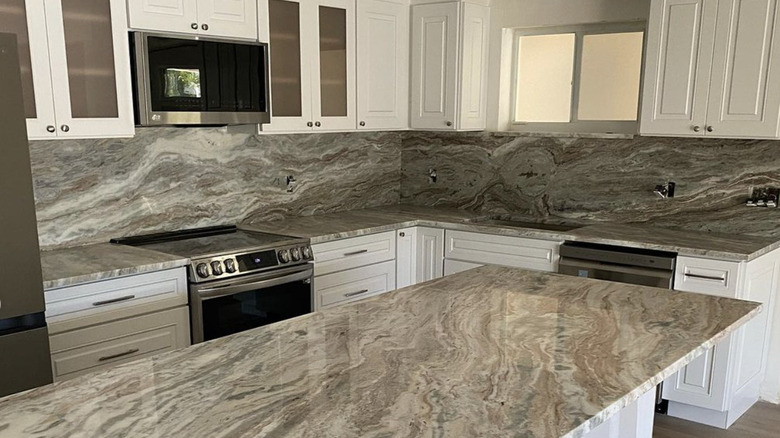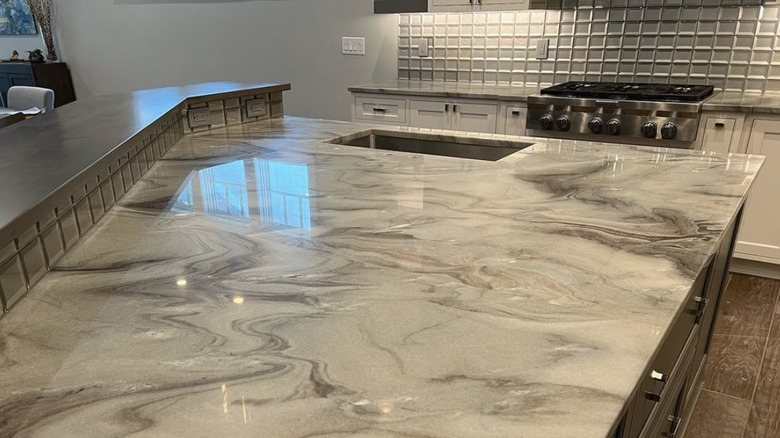This Trending Countertop Material Gets You The Marble Look For Less
Marble has served as one of the most appreciated materials used in interior and exterior design for thousands of years. It's admired for its durability, elegance, and ability to complement virtually any color scheme inside a kitchen or bathroom. Similar to its counterparts granite and quartz, marble offers a smooth, durable surface that can make working around the home both functional and stylish. However, marble is considered a luxury resource, and the process of preparing the stone for interior use is quite labor-intensive, making it one of the most expensive countertop materials to install. But the process of installing attractive natural stone counters doesn't have to exclude homeowners on a budget. If you're looking for countertops that offer a similar appeal to marble without the lofty price, countertops made of dolomite might be a great fit for your home.
Dolomite, in its simplest form, is a mineral typically white or gray in appearance and commonly used to stabilize the environment by neutralizing acidic soil, decontaminating industrial emissions, and purifying water found inside swimming pools and wastewater treatment plants. Its weathering-resistant properties also make dolomite practical for construction purposes, and the mineral is often used to create the asphalt and concrete that make our roads. But what makes this eco-friendly mineral so suitable for your countertops? Learn more about the advantages of installing dolomite counters inside your home, as well as how the price measures up to marble and other natural stone alternatives on the market.
Advantages of dolomite countertops
Dolomite shares many of the same qualities as marble and other natural stones: It's hard, durable, and consists of beautiful earth tones arranged in unique, "streaky" designs mostly seen in white and gray, but also capable of featuring shades of brown, black, or pink. Dolomite countertops are also usually glossy in appearance due to a polished finish applied by contractors either before or after installation. This type of stone is also easy to clean and maintain, with only a soft cloth or sponge and a mixture of warm, soapy water needed to clean the surfaces daily.
However, there are some properties of dolomite that may give it a slight advantage over marble, possibly making the mineral a more suitable option inside bathrooms and kitchens. For example, dolomite isn't as porous as marble, making it less susceptible to staining and damage commonly caused by liquids and acids. Although dolomite is less absorbent than marble, the stone still needs to be sealed at least once each year to protect it from excessive etching and tarnishing. The stone is also more resistant to temperature compared to marble, allowing for the brief application of heat without scorching the countertop's surface. Regardless, avoid placing hot pots, pans, and cooking utensils onto the counters without adding a potholder or trivet underneath, especially if you plan to leave the items on the countertop for a long period of time.
How much do dolomite countertops cost?
Despite an array of positive attributes, dolomite's greatest asset is probably its affordability. Prices for dolomite normally fall between $50 and $75 per square foot, a range much more affordable than the majority of natural stone countertop options. At an average price of $60 per square foot, expect the cost to install dolomite countertops inside an average-sized kitchen to range between $1,800 and $2,400. To compare, marble countertops can cost anywhere from $40 to $200 per square foot, depending on the type, grade, color, and availability of marble used to complete the job. Under this estimation, installing marble counters inside a kitchen of the same size will likely cost homeowners between $1,200 to $8,000.
Prices for dolomite may fluctuate depending on the type of stone, the location of the quarry where the mineral is sourced, and the personal preferences of the contractor working with it. The complexity of the procedure may also drive up the total cost of installation, as those jobs calling for more time or skill to complete are likely to see increased charges for labor. But all in all, taking into account the many properties dolomite has, it's an evenly matched alternative — or even a better stone option — than traditional marble. Homeowners might get more for their money in choosing dolomite for their countertops, especially if living in a household where cutting board mishaps, spills, and other unsightly accidents are commonplace.


